He left Hamas after Oslo, moved to Ramallah, and joined Abbas’ Palestinian Authority. Following the burning of the Dawabsha family and the conflagrations at Al-Aqsa Mosque, Supreme Sharia judge of the Palestinian Authority Dr. Mahmoud al-Habash warns Israel not to test Palestinian patience.
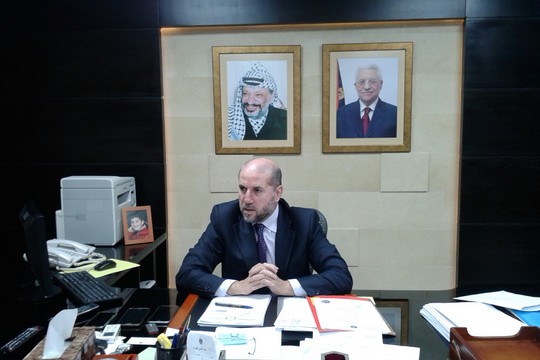
On the charred walls of the Dawabsha home in the West Bank village of Duma, the words “revenge” and “long live the Messiah” were spray-painted by the same Jewish terrorists who burned three of the four family members to death.
The graffiti troubles me. Regardless of how detestable it is, I can understand the logic of revenge; but I cannot understand those who toss in the name of the messiah. The slogan “long live the Messiah,” most closely associated with the Chabad movement, has always seemed strange to me, and the fact that it found its way to this crime is especially disturbing. Why would anyone be interested in fomenting a religious war here?
I arrive in Ramallah to visit Dr. Mahmoud al-Habash, the supreme sharia judge of the Palestinian Authority. Until June 2014, al-Habash served as the minister of religious affairs, but with the agreement to establish a Fatah-Hamas unity government, al-Habash, a former member of Hamas who left the movement in the wake of the Oslo Accords, was forced to resign.
What about Gaza?
Al-Habash is responsible for giving the central, weekly sermon every Friday. Israelis love to talk about the unabashed “incitement” in Friday sermons in order to avoid talking about the ongoing occupation. That way they can focus on the “religious war” that the Muslim world is waging against Israel. Al-Habash knows this all too well. Our meeting takes place in the dark shadow of murder of the Dawabsha family.
“Honestly, what happened in Duma does not surprise me. It was the result of years of cultivating a culture of hate. I believe that the Israeli government is directly responsible for this event — every Israeli government. The settlements and the policies of the Israeli government, led by the Israeli prime minister, for the treatment of the Palestinian people, this extremist, right-wing government whose only understanding of religion and Judaism is hatred for the other, for non-Jews. All that is forbidden by the Torah — thou shall not steal, thou shall not murder — matters only when it comes to how Jews treat one another, and becomes acceptable when it applies to non-Jews.

“When your justice minister, the one who is responsible for the justice system, says that Palestinian children are no more than ‘little snakes,’ she means that they must be killed when they are young. Otherwise they will grow up to become big snakes.”
I begin listing all the condemnations and expressions of disgust — both the honest and the disingenuous — that were heard on the Israeli side since the attacks. There is a feeling that this particular murder really shook Israeli society, and I tell him so.
“I am not claiming that all of Israeli society is uniform. Even the Holy Quran recognizes as much. You are Ahl al-Kitab, ‘people of the book,’ who recognize God and believe in him. I know that not all of Israeli society supports this crime. But why does this matter to me as a Palestinian? Those who hold these positions against Palestinians are also the powerful ones: the government, the settlers, and the army. Who gives the settlers weapons to shoot Palestinians? The government.
This causes the Palestinians to view all Israelis as enemies, and the moderate voice on the Palestinian side becomes silenced. Racism leads to racism, and hate leads to hate. The most dangerous thing that can happen now is that the conflict turn into a religious war. Because in a religious war, even you, a Jewish woman who supports peace, will become a target. And I will become a target as a Muslim. Every Jew across the world will become a target for every Muslim. Will you be able to withstand such a war?
Do you view the conflict as a political one or a religious one at its core?
Of course it’s a political conflict. There is no conflict between the Quran and the Torah. There is no war between Muslims and Jews. But these people enlist the Torah to further their political goals. Is it possible that Allah wants these people to be murdered? It is impossible.
The Palestinians also enlist religion to promote political goals.
This is done everywhere across the world. But today, the official Palestinian establishment — the Palestinian Authority and the PLO — does not do so. On the contrary: look, I am a believer, a religious person, and my entire existence stems from religion. But I understand that religion is one thing and politics is another. There is no compromising over religion — the same does not go for politics. That is why it is so dangerous to use religion for political ends, since religion is absolute. If Allah says so then that is how it is. Can I contradict Allah or negotiate with him? No. But in politics we can negotiate.
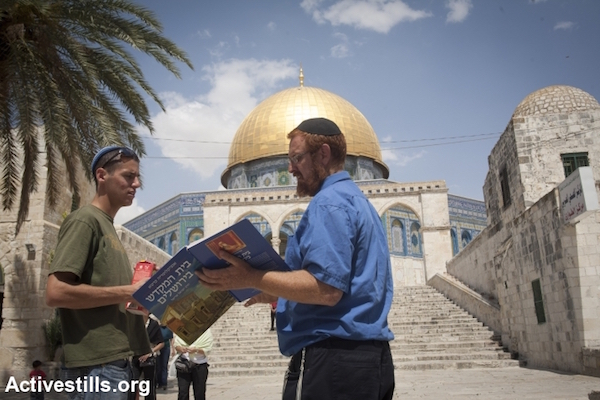
“When Palestinians murdered the family in Itamar, I condemned the murder in a Friday sermon, and said that this is wrong and against the Muslim religion. This, despite the fact that this happened at an illegal settlement and Israelis’ presence there is illegal. Mahmoud Abbas, who is also a religious man, strongly condemned the murder. But I ask you, how many Palestinian children have been murdered since 2004? How many times have Palestinians been attacked by settlers? How many times did they burn homes, mosques and churches, uproot trees, spray paint racist graffiti, throw Molotov cocktails at cars? How many were arrested?”
“Seven Palestinians were killed in July, two of them were under 16. A year ago Muhammad Abu Khdeir was kidnapped, made to drink gas, and burned alive. What was the Israeli government’s response? To murder another 2,000 people in Gaza.”
‘I am willing to die for Al-Aqsa’
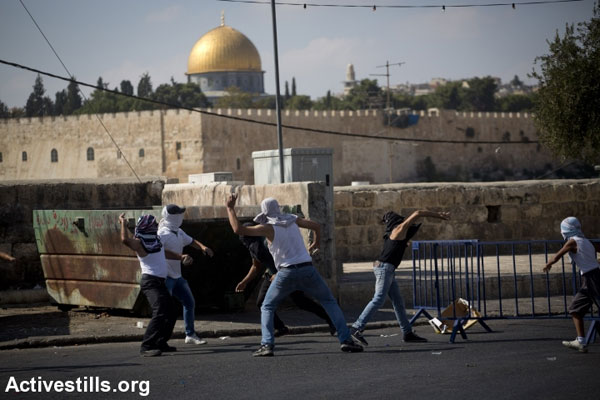
One cannot speak about the religious aspect of the conflict without talking about what has been happening at Al-Aqsa compound over the past few years. Attempts by many — including members of Knesset and even government ministers — to change the delicate status quo in the most explosive place in the world, is equivalent to pouring salt on Palestinian wounds. And perhaps not only the Palestinian; the entire Muslim world is looking at what is happening there. It often feels like the Israeli side simply refuses to understand what kind of powder keg they are dealing with.
“I view myself as a moderate, but I am willing to die for Al-Aqsa Mosque. Without any qualms. When a settler disparages the Prophet Muhammad in the presence of the Israeli army and Minister Uri Ariel — if I were there to hear him I could kill him with my own hands with no problem. So what do you expect from a 20 year old whose blood is boiling? You think that a young Palestinian simply decides to pick up a stone just like that? No. You are the reason. You bring him to that point.”
Is there coordination between Israel and the Palestinian Authority vis-a-vis maintaining the status quo at the compound? Do you coordinate with Israeli authorities?
“There is no coordination. We are not willing to have any coordination with the Israeli side in everything having to do with the Haram al-Sharif compound. None. Israel is not involved in anything having to do with Al-Aqsa Mosque. We coordinate solely with Jordan. Israel is of no relevance to this issue. Al-Aqsa is occupied territory and we are not willing to coordinate with an occupying power.”
“Following the occupation of 1967, a status quo was established vis-a-vis Al-Aqsa Mosque. From 1967 until 2000 the mosque was managed by the Waqf. After Sharon went to the compound in 2000, Israel closed the Mughrabi Bridge and began managing entry for non-Jews to the compound. This conflicted with our agreements with Jordan, as well as the understandings between Jordan and Israel. We refuse to accept this.”
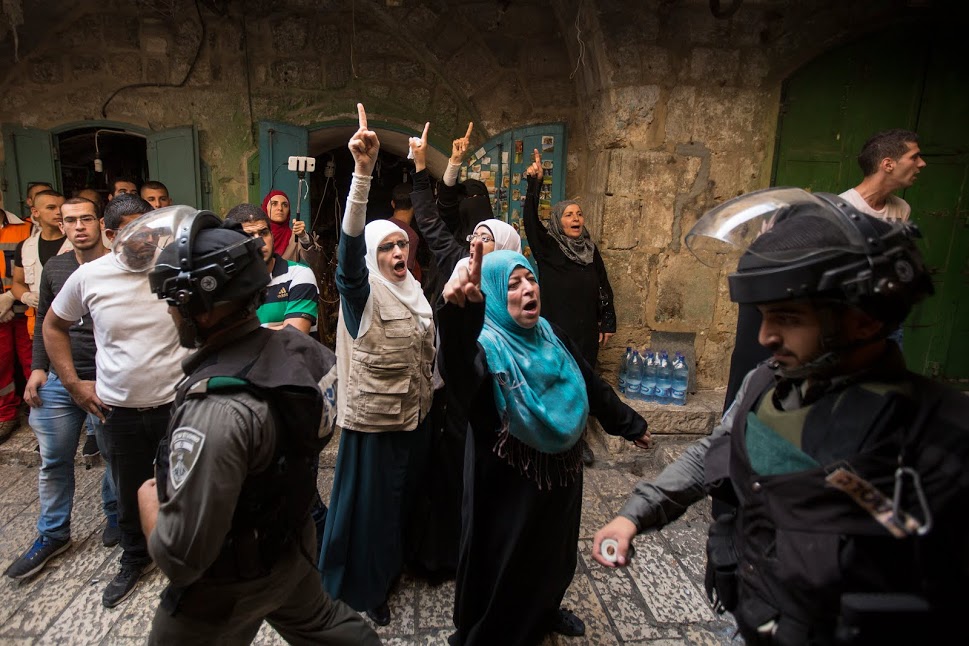
“If Israel continues to violate the status quo, we could find ourselves in a religious war. These are two small words that contain a very big danger. I urge you: stop testing Palestinian patience. This kind of situation will lead to disaster. Is this what you want? Naftali Bennett, Yehuda Glick, the settlers, and Benjamin Netanyahu himself want this disaster. If I were an Israeli, I would put Netanyahu on trial for treason. He is ruining Israel.”
On the other hand, the denial of certain Palestinians of the connection Jews have to the Temple Mount worriers many Jews, and not only religious ones.
“On this issue, like on every issue, there are two narratives: the Palestinian narrative, according to which historic Palestine belongs to the Palestinians, and the Israeli narrative according to which the land is Jewish land. So what do we do now? A certain reality already exists. In your history there was never any Jewish presence in certain areas on the coast, but look, you built cities there. I understand that if we stay with the historical narratives, we won’t get anywhere.”
“Personally I can tell you that as a religious person I reject all narratives according to which Jews have rights to Al-Quds. But I understand that you, as a Jew, believe something else, and I respect your belief. According to my belief, Jerusalem and Al-Aqsa are exclusively Muslim. I am a believer. You do not agree with me, but you must respect my beliefs.”
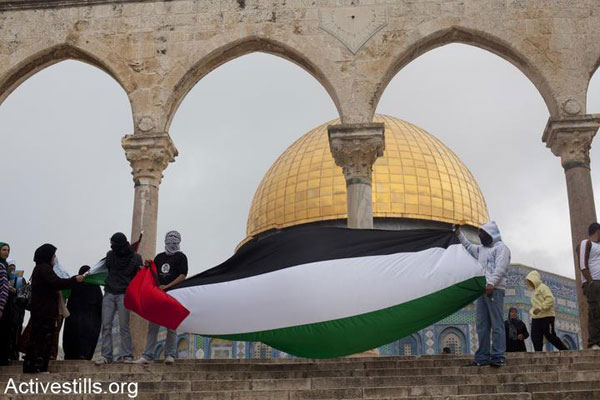
“Our problem is not competing historical narratives. Our problem is the political reality. If you want to turn this from a political problem to a historical or religious one, you won’t find yourselves facing 10 million Palestinians, but rather 2 billion Muslims. Are you able to deal with 2 billion Muslims? I don’t think so. If the Muslim world goes to war over Al-Aqsa, it will be willing to sacrifice even a billion out of those 2 billion. But how many Jews do you think will be left? Therefore it is in your best interest to leave the conflict in the sphere of politics.”
The Israeli fear is that if you do not recognize my historic right to this place, you do not recognize my right to be here.
“I am not interested in mixing the two issues. There is a religious issue, a historic issue, and a political issue. I can have a discussion on religion with clerics alone. I cannot have a historical discussion, because I am not a historian. But we must talk about the political issue.”
“After all, if we want to talk about historic rights, then my parents were born in Ashkelon. My grandfather is buried in Ashkelon, I have seen his grave. If the issue is a historic one, then I want to return to Ashkelon. But because the issue is a political one, then I want a Palestinian state within 1967 borders. Ashkelon will not be included in it. I want only 22 percent of my historic land. It is in the best interest of Israelis that we speak in political rather than historic or religious terms.”
And what will happen to the 350,000 settlers?
“650,000 including the ones in Jerusalem. They will all have to leave, until the very last one of them. Not a single Israeli will be left in the State of Palestine, even Ahmed Tibi.”
Even those with a Palestinian passport?
“Look, I can speak like a politician, but I wish to say it to you simply: we do not want them. It is not possible and it is illogical — it just won’t work. Let them live and be healthy, but far away from us. As far away as possible. Sharon removed settlers from Gaza, Begin removed them from Yamit. In 1948 you removed a million Palestinians with great efficiency. I believe that you will be able to remove 650,000 settlers.”
From Hamas to Abbas
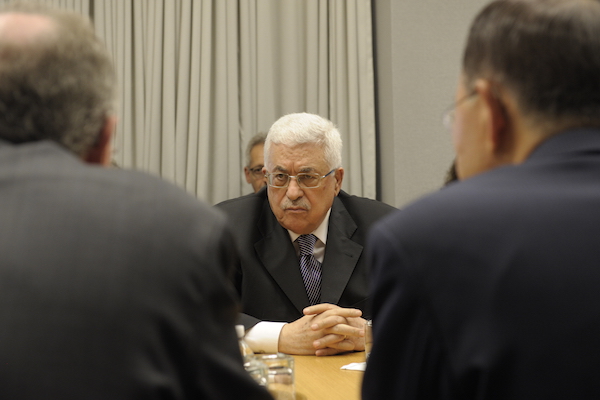
I remind myself that this man, who is speaking about a Palestinian state on 22 percent of historic Palestine, was a former member of Hamas and one of the founders of its armed wing, the Izz ad-Din al-Qassam Brigades.
“I joined the Muslim Brotherhood in 1979,” says al-Habash, “and when Hamas was established in 1988, no one knew my name except for Israeli intelligence. I was the first cleric of the Muslim Brotherhood and Hamas to be arrested by Israel.”
“After my release from prison I was one of the founders of the Izz ad-Din al-Qassam Brigades in 1991. 1992 saw the expulsion of 415 Hamas and Islamic Jihad members to Lebanon (in the wake of the kidnapping and murder of Border Policeman Nissim Toledan, O.N.), and I managed to escape. For half a year I hid in the alleyways of Gaza. I didn’t sleep at home, I changed my address, I didn’t drive a car, and I evaded expulsion.”
“In 1993 came the Oslo Accords, and Hamas faced a dilemma: how to deal with the new reality after the agreement. I believed that we needed to be realistic, and that Hamas needed to be part of the political process and join the PLO. This is where the disagreements began. Eventually I left Hamas on May 3, 1994, and continued to work as a non-affiliated, independent cleric until the 2007 revolution. In 2007 I came here to Ramallah.
Toward the end of the conversation, the lights of the entire building turn off and the sound of jets can be heard from outside. “Maybe they heard that there is a Jewish woman here and they came to save you,” he says with a smile. “Actually, if they knew you were here, maybe they prefer that we keep you and you don’t go back. Ahalan wa sahalan. You can be the president’s advisor on Iranian affairs.”
This article was first published in Hebrew on Local Call. Read it here.


